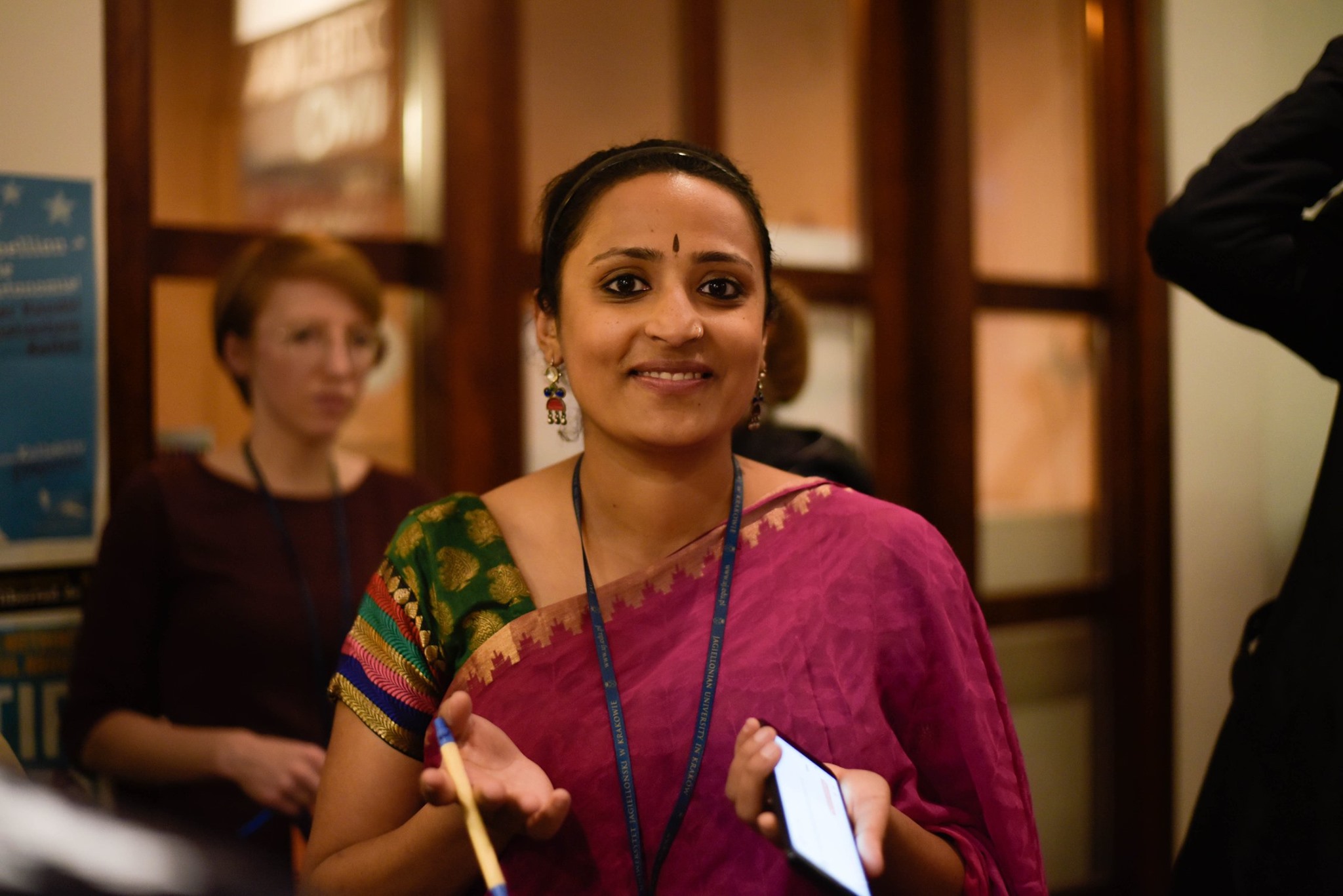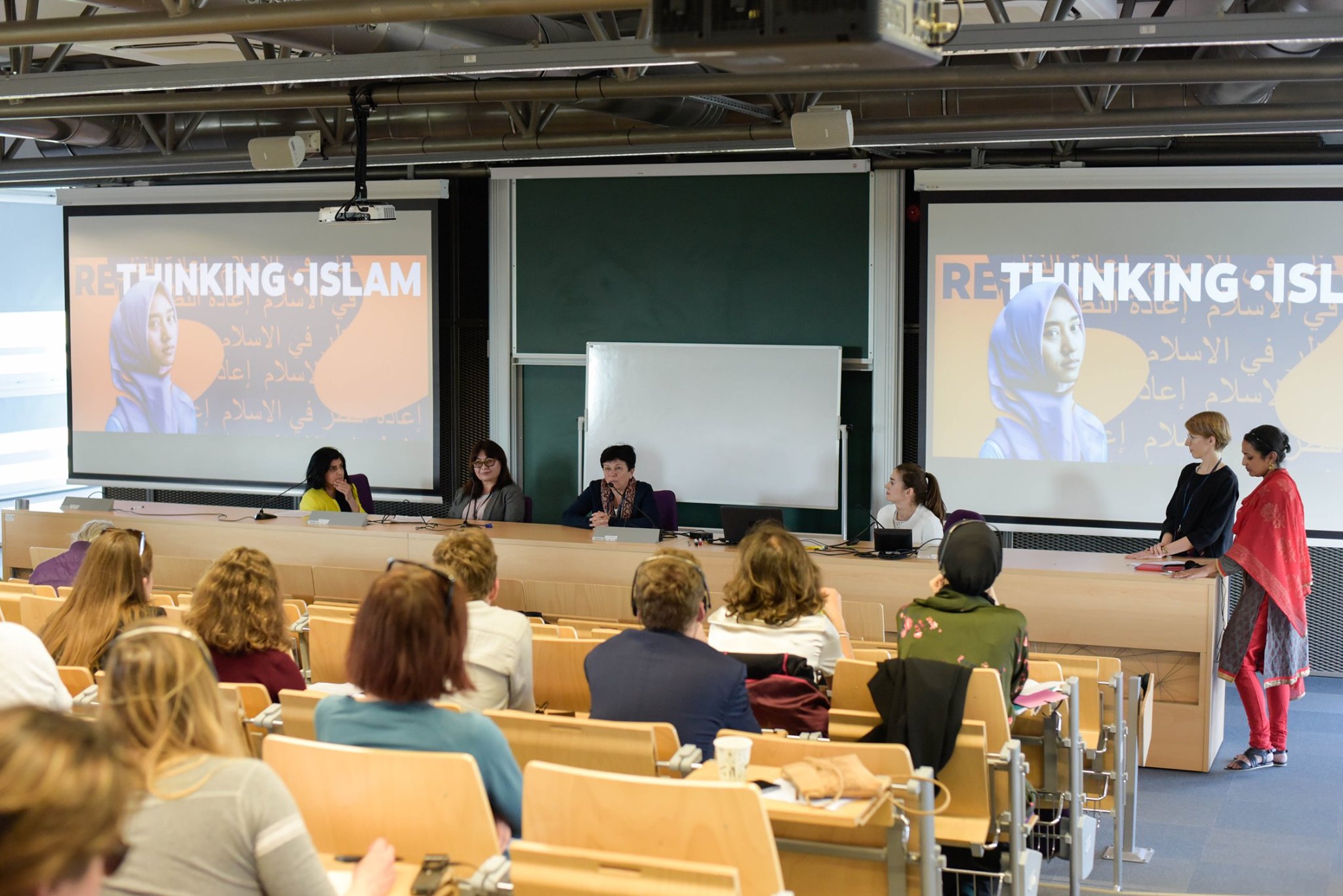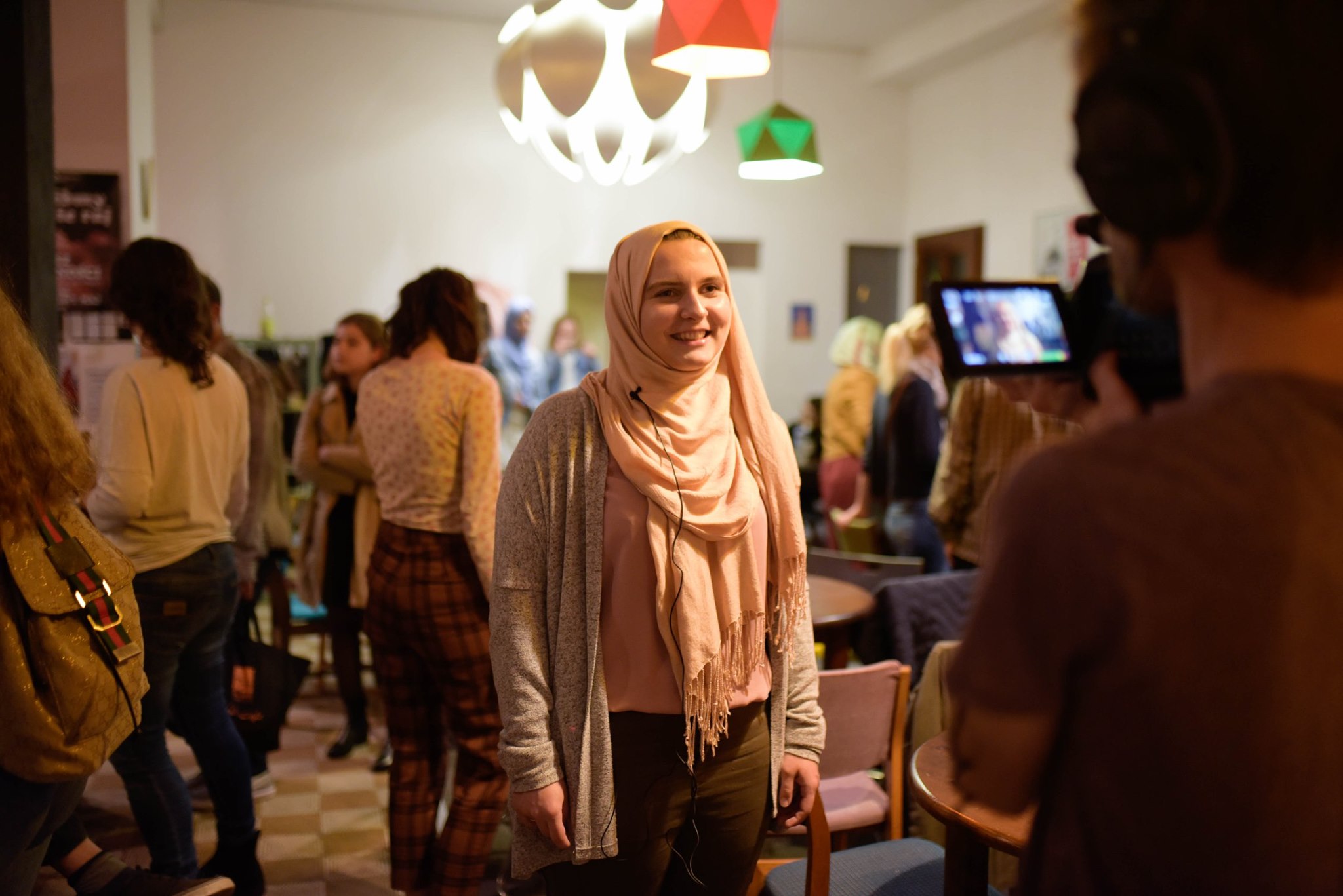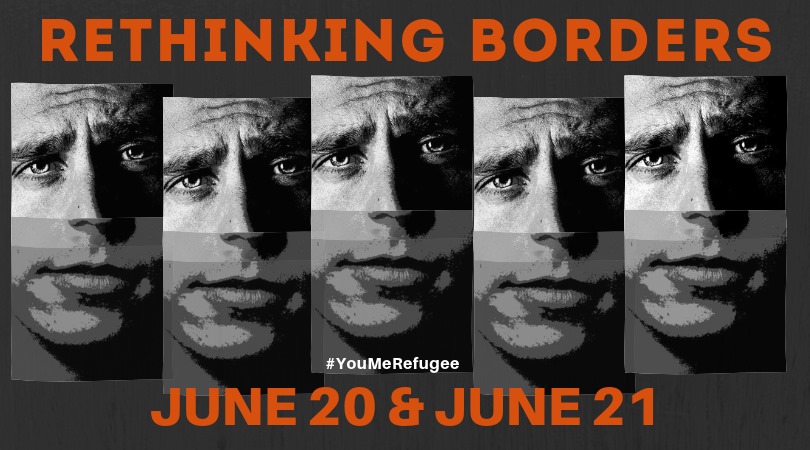Rethinking Islam, Rethinking Borders & Rethinking Refugees

We recently sat down for an interview with Sindhuja Sankaran, founder of Rethinking Refugees - Knowledge & Action to chat about their groundbreaking recent event "Rethinking Islam", the experience of being Muslim in Poland, the pressing need for global unity and their upcoming event taking place on World Refugee Day - "Rethinking Borders", which will be the only event of it's kind taking place in the whole country.
Rethinking Refugees is hard at work, breaking down the barriers built in our hearts through workshops, food, concerts, presentations, lectures, real people telling real stories and most importantly: human connection. Teaching us that with shared emotion, shared love, shared existence and a shared planet - the things we have in common far outweigh the paranoid and outdated concept that there is any kind of "us and them", or any kind of war that needs to be had, except against the violent segregation of souls.
Congratulations on the fantastic success of your most recent event 'Rethinking Islam, we hear it was the biggest event of its kind ever to take place in Krakow and probably even Poland!
Thank you for those kind words. When we were planning the event, we were already, to some extent, sure that the event would be 'one of a kind.' There were a lot of people congratulating us on the 'bold move,' which made me realise that it is absolutely imperative to create awareness about such issues. If people construe talking about Islam as something courageous because of the social context – that is, in Poland, then we already know where the problem lies. Thankfully we were not 'greeted' by any far right-groups and all three days were smooth and amicable.

Can you tell us about what took place at 'Rethinking Islam'?
Rethinking Islam began with a movie screening at Kino Pod Baranami. The movie was a Lebanese one titled 'Where do we go now?' directed by Oscar-nominated director Nadine Labaki. The film was then followed by a discussion on issues of feminism, religious secularism, and the use of different forms of in spreading awareness.
The second event, the Iftar, was probably the highlight of Rethinking Islam. It was perhaps one of the first times you could see Muslim and non-Muslims in the same room, sharing a meal, sharing a conversation, making friends, and integrating. Food seems to bring people together, and this event is a testament to that. I hope we have many opportunities, such as this, to actively engage in the integration of the two communities.
The third event was the workshops that focused on different expressions of Islam through the medium of art, calligraphy, and music. Other workshops are more remedial in nature and tackle issues like hate crimes against Muslims, interfaith dialogue, and understanding Islamic feminism. Despite starting instead early this time, and the sun shining brightly, people showed up and were very enthusiastic. We also had a workshop for kids. Our calligraphy expert, Nourredin el Manouri from Poznan also offered to write kid's names in Arabic as they left. All in all, the workshops provided theory, fun, and integration.
The main event was, of course, the panel discussions on Facets of Islam, Islam in Poland, and challenges of Islamophobia. The debate that followed every panel was stimulating, and people indeed asked tough questions! Again, this time around since the panellists included academics, social activists, and policy experts and so on, we saw a topic, such as Islam being addressed from all aspects, so everyone understands the importance of connecting science and practice.
You had an open 'Iftar,' which is an Islamic celebration of breaking the Ramadan fast. What is the meaning behind Iftar, and why did you have the idea behind inviting non-muslims to join the occasion? How did it turn out?
Well, Iftar literally can be translated to 'break of a fast,' which is what Muslims do during Ramadan when they eat their first meal after a day of fasting. In fact, they call this meal, which they have in the evening 'breakfast' rather than 'dinner'! They break their fast at the time of the call for the evening prayer. Generally, Muslims gather and break the fast together. We, therefore, thought to create that for Muslims here, an opportunity for them to be with their peers and break the fast together. Understanding each other's customs and values would require one to actually experience it. There was no lecture, no one was preaching, no one was handing out pamphlets, but people got to see and experience one of the most important events for Muslims and share that with him. This is the reason we wanted to invite Non-Muslims as well.
Moreover, facilitating the integration of the two communities is the key to secular living, and what better way to do it than with food. It was also crucial for the Muslim community to know that other non-Muslims in Krakow want to integrate and create an inclusive environment. This is the reason why I think Iftar was probably the most significant success of the event.
The turnout was absolutely brilliant, we had about 160 people on average, and there were literally no leftovers. However, I have to give a massive shout out to our cooks who volunteered to prepare the meals. Coordinating who was cooking what etc. was not easy, moreover to cook for over 100 people...but we made it with overwhelming success. There was Middle Eastern food, Polish food, Indian and Pakistani food, and a lot of vegan options!! I am still gutted I couldn't try them all; the perils of organisation :-)
However, most importantly, the credit for the idea of Iftar goes to Ehab-Al-Otibi and Huda Awad. We had a discussion with them after one of our other events - Rethinking Rohingyas, and they suggested to do this as it was the month of Ramadan. Therefore in cooking terminology, they were the master chefs, and we were merely their humble cooks :)
.jpeg?1560243431562)
What are some common misconceptions about Islam?
Well, if I had a penny for every time I heard this rhetoric...There are indeed many misconceptions, but I will choose to focus on the two most common ones.
(1) Islam promotes terrorism and violence
Islam, like any other religion, doesn't promote violence or peace. It's what one chooses to take from the faith and combined with ideologies that lead to more harsh consequences. Look at the Buddhists committing atrocities in Myanmar with the Rohingyas, but do we say that Buddhism promotes violence? What about that terrorist from Christchurch who massacred Muslims based on his ideology, does Christianity encourage violence? Hindu extremist parties such as RSS are killing people in the name of 'Making India a Hindu country.' Do people say Hinduism promotes violence? It is the same way with Islam; sadly, since the 9/11 attacks and the 2003 Iraq invasion, the rise of ISIS has heuristically made people assume only Muslims can be terrorists. Just after the Paris attacks, ISIS claimed responsibility for an attack in Lebanon. Therefore, people pick and choose how they want to follow their religion and to make a sweeping statement such as ''Islam being a religion of violence' is inaccurate.
(2) Islam oppresses women
People, unfortunately, associate Muslim women with oppression; especially with wearing the Hijab. Indeed there are many countries like Saudi, where women have limited to no rights and forced Hijab, people should, however, realise that Saudi Arabia does not reflect all Muslim countries. Look at Lebanon, where Beirut is considered to be the 'Paris of the Middle East,' women can wear whatever they want, they can smoke, drink but at the same time, women also wear a Hijab because they choose to do so. Again, in Pakistan, you have the concept of stoning and honour killings, but one cannot take practices of these specific Muslim countries and generalise it to all Muslim countries. Indonesia, for instance, is another Muslim country where women have rights. So, it seems like, again, people use one type of example, that the media exemplifies and apply that norm to all Muslim countries, and then discriminate leading to bigotry.
What do you think an average person from a small village in Pakistan might want to communicate with a person in a small village in Poland?
Pakistanis are very welcoming and hospitable, so I would think they would first show humility and thank the person in a Polish village for allowing to opportunity of having a dialogue. They would probably refer to the person in Poland as a 'brother'. He would possibly comment and say that if God permits, we can all live harmoniously (Inshallah)?

How are Muslim people generally perceived in Poland, has it always been this way, and is this perception evolving?
Results from the PEW research poll revealed an unfavourable view of Muslims by Poles. Furthermore, the research also revealed that most people in Poland had the opinion that Muslims want to be distinct and not part of the larger society. This could be because of the unrealistic expectation people might have about migrants needed to assimilate as supposed to integrate. Wearing a headscarf or celebrating specific festivals is a way to maintain a sense of their identity living abroad. People can still go to a mosque and integrate within society. I believe this mind-set is what makes Poles think that there is a need for Muslims to be distinct. The research also showed that when asked specifically about support among Muslims for extremist groups like ISIS, a quarter or more Poles say many, or most Muslims do support ISIS. Thus, if this perception of Muslims supporting an extremist group is so prevalent, there no doubt that Poles would see Muslims as a threat. There is also a complete lack of knowledge about Islam and its facets; one of the reasons why we wanted to organise this event.
I remember, once when I was distributing flyers about an event on Refugees, a man asked me why it's essential that Poland accept refugees. I gave my fair share of answers, and then he said ''These Muslim refugees will just come and change everything about Poland''. So firstly, there is an immediate conclusion that all refugees are Muslims, an understandable misconception since the crisis was most prominent during the war in Syria. He later went on to say that refugees are welcome here, as long as they don't impose their values on Poles, such as violence and killing non-Muslims. Finally, he also went on to say that if more refugees are accepted then, they will procreate and have 10 babies and those 10 babies will have 10 later as that's what Islam dictates. He then said that his 'Polska' will then become a Muslim country. Of course, I tried to explain that won't be the case, interjected with a little joke about how refugees are people, not mice for them to have 10 babies. But I also tried explaining that for instance, in a country like India, where the Mughal dynasty (Muslims) ruled the country for over 400 years still did not lead to India being a Muslim Majority country. But somehow that analogy was lost on him.
Another issue that must be considered is about the overestimation of Muslims. Dermana Seta, an expert on combatting hate speech and violence against Muslims from the Office for Democratic Institutions and Human Rights (ODIHR) during her talk, revealed something unbelievable. She mentioned that less than 1% of the population in Poland is Muslim, but when Polish people were asked to estimate the percentage of Muslims in Poland, they overestimated as 7-8%. But you see this trend not only in Poland but in other countries like Australia, Belgium, Britain, Canada, France, Germany, Italy, Netherlands, Russia, Spain, Sweden and US where people grossly overestimate the Muslim population. Why could this happen? In my opinion, when people lack knowledge about a minority group, they already show negative attitudes and prejudice, this minority group becomes more salient when asked about, they become more 'available.' This explanation can be based on the classic theory on 'availability heuristic' by Kahneman and Tversky. The theory basically states that the easier it is for you to think of an example of something, the more likely you are to estimate its prevalence. Thus, when asked ''How many Muslims are there in Poland'' people might think of the stereotypical image of a Muslim, and would perhaps perceive them as a threat, so they could say ''I feel threatened by this group, so there must be a lot of them''; that is they become more 'available'. Another, more simplistic explanation can be that perhaps owing to the homogenous nature of Poland for many years, the sudden presence of migrants of different skin tones might make it indistinguishable for Poles. The most salient ones are, of course, 'Muslims' from Arab countries. Therefore people might observe other dark-skinned people be it Brazil or India and would assume they are Muslims and thereby overestimating the presence.
However, based on the event, I hope to believe that more people are open to knowing about the culture and want to promote secularism.

What would you like to share with those who might feel uncomfortable attending an event like this?
Be open, be welcoming. We are merely presenting facts and opportunities to interact. See the facts and then make an informed decision, but to make any kind of choice you need to have the knowledge. That is what we hope to offer. I mean if you like Hummus and Falafel wouldn't you want to meet some people who are from the countries that invented those fantastic dishes?
It seems like you guys are really on a roll with making the world a more connected place! What's coming up next from Rethinking Refugees - Knowledge and Action?
I am extremely happy that we were a small part of what the world needs in terms of raising awareness about important issues and we will continue doing so. Having said that, on June 20th 2019 it's World Refugee Day and to show our solidarity with refugees we will be organising an event in Krakow titled ‘’Rethinking Borders: #YouMeRefugees” on June 20th and 21st. This will be the only event of it's kind taking place on World Refugee Day.
The aim of the event is to hear the stories and journeys of refugees…in person!! We will have 4 refugees amongst us and we will have a chance to engage in open dialogue. We will also have a theatre workshop to show theatre can used as a powerful tool for empowerment and spreading awareness. We will also screen a documentary – Mission Lifeline. This is about the ship with refugees that was refused by Italy and Malta and finally Spain welcomed them. The filmmaker of the documentary will be with us. Finally, on 21st evening we will have a concert of one of the Syrian refugees supported by other local artists.
June 20th – Theatre Workshop and Panel @ Hevre
June 21st – Concert @ Space Craft Pub
We are very excited about this as this would be the first time in Krakow where people will have a chance to meet refugees from Syria, Afghanistan and Iraq and engage in open dialogue.
Links:
Rethinking Borders Facebook Event
Rethinking Refugees on Facebook

Comments
Very biased and over simplying and almost negating view on Global Islamic Agenda (redical), what is the criteria to filter who is radical or not radical, entire world is facing problem from this Doctrine. Regarding Analogy from India on Mughal Dynasty India used to be a Vedic Hindu country and out this 2 Muslim nation's been carved out Namely Pakistan and Bangladesh and world knows what Pakistan is endorsing. The biggest proof of concept not having them is Zero terror attacks.
ReplyIf you think Islam's agenda is only radicalisation, then it pretty much reiterates the need for such events. And please note that Hinduism was never a religion and just a way of life, it became a religion after there were many other religions that came to the country. The reference to the Mughal dynasty was merely to point out that just because people of Islamic faith are in a country, that wouldn't make that faith the majority. If the 1.8 billion Muslims in the world followed the 'radical' doctrine....well :) Your comment literally shows what was pointed out about generalisation of an entire religion based on one country. Somehow the militant Hindu groups such as RSS is not even considered? I'm sorry but, this comment is nothing short of bigotry.
Reply"entire world is facing problem from this Doctrine" Actuallly, i'm not facing a problem from any "Islamic Doctrine". So, please don't speak on behalf of the whole world. The only group I feel threatened by are the kind of people who want to judge billions of individual people they never met and never talked to and never heard the opinions of. Most of whom are just everyday people getting on with their lives, trying to be good parents, good friends, good employees, good people. Running out of toilet paper, stubbing their toe, falling in love, trying to make enough money to get by, appreciating a good hot cup of tea on a cold morning, trying to figure out how to be a good person, just trying to be happy in whatever way they can and get through the week. Unfortunately a minority of people from across the world, from all countries, religious or atheist, scientific or spiritually minded are deeply unhappy and uncomfortable in their own skin, in their own daily lives, in their own world and they feel the need to blame this on an entire other group or culture. These are the only people I have a problem with. I don't hate them though, it just makes me sad and I hope they find enough happiness in themselves not to spend their time hating billions of complete strangers.
Reply